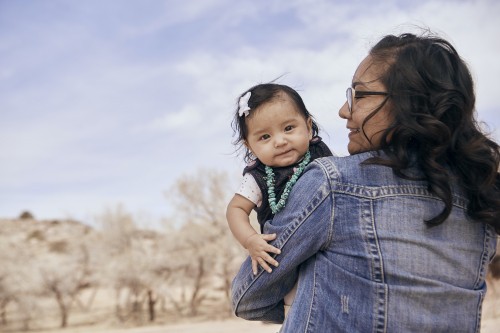About
We are currently conducting a study to assess whether a new product, called Nirsevimab, protects infants against Respiratory Syncytial Virus (or RSV). This new product is similar to a product currently used, but requires only one dose to protect babies throughout the entire RSV season.
Background on Respiratory Syncytial Virus (RSV) and Nirsevimab
RSV is a common virus (germ) that causes respiratory illness, and can be spread by coughing or sneezing or by touching things an infected person has touched. Nearly all children will have an RSV infection at least once by their second birthday. In older children and young adults, RSV usually just causes a mild cold. In infants, especially those less than six months old, RSV infection can cause inflammation of the airways, which may require hospitalization. Some children develop wheezing or asthma that may continue for years after the RSV infection is over.
Severe RSV is more common in Native American communities compared to the rest of the US. One in 10 Native American babies in the Southwest United States will be hospitalized with RSV each year. There is currently no licensed vaccine to prevent RSV in infants or adults.
There is a product called Synagis® that can be given to infants to prevent RSV in the first year of life. It is made from antibodies, the parts of our body that fight germs. However, it is only available for babies at high risk, including those born too early and those born with heart or lung disease. It also requires five monthly injections. A new product, called Nirsevimab, has been developed by the same company that makes Synagis®. Nirsevimab was designed to be stronger and to last longer than Synagis®, so that only one dose is needed to protect babies throughout the RSV season. It is designed to be used to protect healthy babies, as well as high-risk babies.
About the MELODY RSV Prevention Study
So far, Nirsevimab has been given to over 1,000 babies in three studies at sites around the world. It was found to be very safe and effective in preventing severe RSV. Now, a larger study, called the MELODY Study, is being done to see if Nirsevimab works to keep babies from getting RSV. Because RSV is so common among Native American babies, it is important to show that this product will work in communities where it is needed most.
Babies who participate in the study will receive a shot of either Nirsevimab or saline. They will be followed for approximately 18 months to assess any side effects and to see if they are protected from RSV disease. Blood samples will be collected four times during follow-up. If a participant has a respiratory illness, a nasal swab will be collected to test for RSV and other germs. If the participant is hospitalized with a respiratory infection, a blood sample will also be collected. Samples and data will not be labeled with any personally identifiable information.
During the 2019/2020 RSV season, the study enrolled 1,492 babies globally. Across CAIH sites on Navajo Nation, 80 participants were enrolled in Fort Defiance (n=33), Gallup (n=21), and Shiprock (n=26). Enrollment in 2020 was suspended due to the COVID-19 pandemic and will continue in the fall of 2021.

